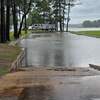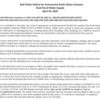Officials: Be safe as summer heats up; NWS issues first heat advisory for Cherokee County, East Texas
It’s that time again – officials are urging east Texans to stay out of the heat as summertime temperatures continue to rise.
The National Weather Service (NWS) Shreveport office issued the year’s first heat advisory for Cherokee County last week. Advisories for areas around Texas, including San Antonio, Houston, Galveston and Dallas/Fort Worth, started being issued in mid-June. Last week’s heat advisory forecast heat indices ranging from 105 to near 108 degrees, when combined with temperatures in the mid 90s, across much of East Texas, North Louisiana, and extreme southern Arkansas.
“Forecasts for this summer, unlike most summers, will likely see more heat advisories due to the rainfall we have seen in the area over the past several months because humidity values will be slightly higher,” said local meteorologist Marc Scirto, with ABC-KLTV Channel 7 out of Tyler. “With higher humidity values, we’ll see Temperature-Humidity Index values above 105 degrees, which is what normally triggers the heat advisories.
“Normally we will see a handful of heat advisories during the summer months, but for this year, I believe we will see more, just due to the higher humidity that we are experiencing, due to the rainfall totals we have seen this year. If the rain slows down this summer, we will see lower humidity values and hence, fewer heat advisories. Another plus to the higher humidity, we see slightly cooler temperatures. A moist soil heats up slower than dry soil, therefore contributing to somewhat cooler actual temperatures.”
According to the NWS’s website, “a heat advisory means that a period of hot temperatures is expected. The combination of hot temperatures and high humidity will combine to create a situation in which heat illnesses are possible. Drink plenty of fluids, stay in an air-conditioned room, stay out of the sun, and check up on relatives and neighbors.”
A heat advisory is generally issued within 12 hours of the start of extreme heat conditions, the NWS explains. Advisories are issued when the maximum heat index temperature is forecast to be 100 degrees or more for at least two days and nighttime air temperatures aren’t expected to drop below 75 degrees.
“These criteria vary across the country, especially for areas that are not used to dangerous heat conditions,” NWS website states. “Take precautions to avoid heat illness. If you don’t take precautions, you may become seriously ill or even die.”
NWS’s website explains the heat index is a measure of how hot it really feels when an area’s relative humidity is factored in with the actual air temperature.
“As an example, if the air temperature is 96 degrees and the relative humidity is 65 percent, the heat index --how hot it feels -- is 121 degrees.”
The National Weather Service initiates alert procedures when the heat index is expected to exceed 105 to 110 degrees (depending on local climate) for at least two consecutive days.
The U.S. Centers for Disease Control and Prevention reports extreme heat events, or heat waves, are a leading cause of extreme weather-related deaths in the country -- there are more heat related deaths each year than those caused by hurricanes, lightning, tornadoes, earthquakes, and floods combined.
“Heat-related illnesses are caused by your body’s inability to cool down properly,” the CDC’s website states. “The body normally cools itself by sweating. But under some conditions, sweating just isn’t enough. In such cases, a person’s body temperature rises rapidly. “Very high body temperatures may dam-age the brain or other vital organs.”
Several factors can interfere with the body’s ability to cool itself during extremely hot weather, including age, obesity, fever, dehydration, heart disease, mental illness, poor circulation, sun-burn, prescription drug and alcohol use and even other weather phenomena.
“When the humidity is high, sweat will not evaporate as quickly, preventing the body from releasing heat quickly,” the CDC reports.
Some groups of people have higher risks for experiencing heat-related death, including infants and children up to 4 years of age; people 65 years of age and older; people who are over-weight; and people who are ill or on certain medications.
So how can you beat the heat?
The CDC recommends these tips:
- Stay in an air-conditioned area during the hottest hours of the day. If you don’t have air conditioning in your home, go to a public place such as a shopping mall or a library to stay cool. Cooling stations and senior centers are also available in many large cities for people of all ages. Air conditioning is the strongest protective factor against heat-related illness. Exposure to air conditioning for even a few hours a day will reduce the risk for heat-related illness.
- Wear light, loose-fitting clothing.
- Drink water often. Don’t wait until you are thirsty.
- Avoid unnecessary hard work or activities if you are outside or in a building without air-conditioning.
- Avoid unnecessary sun exposure. When in the sun, wear a hat, preferably with a wide brim.
Please support The Cherokeean Herald by subscribing today!
